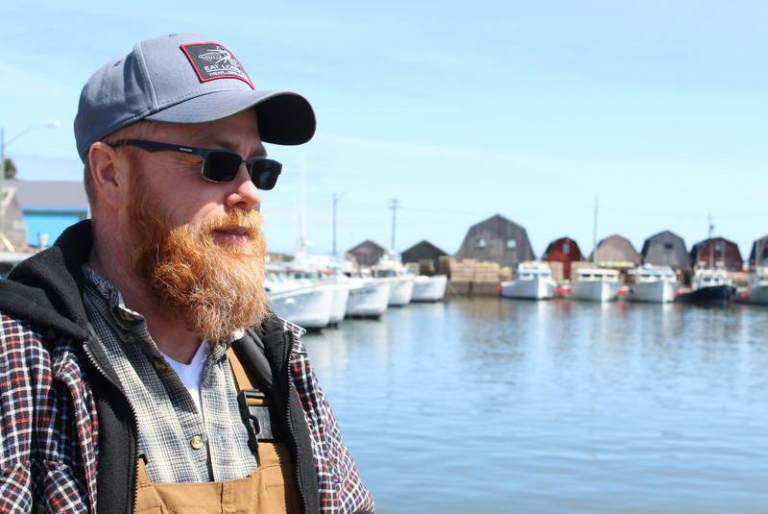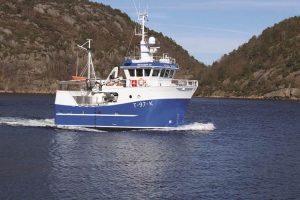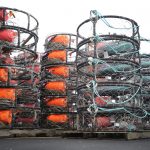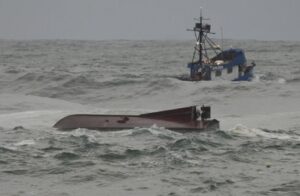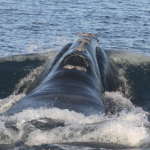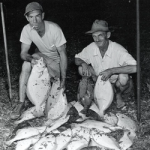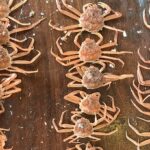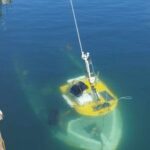 For the first time since 2008, a politician from Newfoundland and Labrador will head up the country’s Department of Fisheries and Oceans and Canadian Coast Guard. Joanne Thompson was sworn in as federal minister of Fisheries, Oceans and the Canadian Coast Guard on Friday, March 14, 2025, in Ottawa in the cabinet of new Prime Minister Mark Carney. Thompson, the MP for St. John’s East, was first elected in September 2021. She was most recently Minister for Seniors under the former prime minister, Justin Trudeau. more, >>CLICK TO READ<< 15:31
For the first time since 2008, a politician from Newfoundland and Labrador will head up the country’s Department of Fisheries and Oceans and Canadian Coast Guard. Joanne Thompson was sworn in as federal minister of Fisheries, Oceans and the Canadian Coast Guard on Friday, March 14, 2025, in Ottawa in the cabinet of new Prime Minister Mark Carney. Thompson, the MP for St. John’s East, was first elected in September 2021. She was most recently Minister for Seniors under the former prime minister, Justin Trudeau. more, >>CLICK TO READ<< 15:31Category Archives: Canada
Atlantic lobster industry could be hurt by tariffs from China, U.S.
 Atlantic Canada’s $2.9-billion lobster industry could be impacted by tariffs imposed by the United States and China, an industry spokesperson said Tuesday. “At the moment we really don’t know how much impact there will be,” said Geoff Irvine, executive director of the Halifax-based Canadian Lobster Council. China imposed a 25 per cent tariff on Canadian seafood March 20, and U.S. President Donald Trump has threatened to begin tariffs on Canadian products on April 2. Tariffs on Atlantic Canada’s lucrative lobster fishery were among the topics of discussion at the Maritime Fishermen’s Union annual convention, held in Moncton Monday and Tuesday. Irvine said Atlantic Canada exports approximately $2.9 billion worth of lobster annually, with 67 per cent going to the United States and 20 per cent going to China. more, >>CLICK TO READ<< 08:34
Atlantic Canada’s $2.9-billion lobster industry could be impacted by tariffs imposed by the United States and China, an industry spokesperson said Tuesday. “At the moment we really don’t know how much impact there will be,” said Geoff Irvine, executive director of the Halifax-based Canadian Lobster Council. China imposed a 25 per cent tariff on Canadian seafood March 20, and U.S. President Donald Trump has threatened to begin tariffs on Canadian products on April 2. Tariffs on Atlantic Canada’s lucrative lobster fishery were among the topics of discussion at the Maritime Fishermen’s Union annual convention, held in Moncton Monday and Tuesday. Irvine said Atlantic Canada exports approximately $2.9 billion worth of lobster annually, with 67 per cent going to the United States and 20 per cent going to China. more, >>CLICK TO READ<< 08:34
Raising the sealing: Central Newfoundland Conservative candidate promises to revive beleagured seal hunt
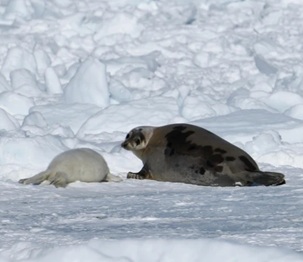 The incumbent Member of Parliament for Central Newfoundland is vowing to bring back the seal hunt in the province. In an announcement made via a social media video post from outside the closed seal processing plant in Fleur de Lys on the Baie Verte Peninsula, Conservative candidate Clifford Small said restoring the seal harvest would bring balance to the ocean ecosystem and protect harvesting jobs and a way of life that has fallen by the wayside in recent times. Small — who was first elected in 2021 to represent the riding formerly known as Coast of Bays-Central-Nortre Dame — alleged the Liberal government has been trying to end the harvest. For the last decade, he said, the Liberal government has refused to listen to workers in the fishing industry and to evidence that showed unchecked seal and sea lion populations were depleting fish stocks. more, >>CLICK TO READ<< 10:14
The incumbent Member of Parliament for Central Newfoundland is vowing to bring back the seal hunt in the province. In an announcement made via a social media video post from outside the closed seal processing plant in Fleur de Lys on the Baie Verte Peninsula, Conservative candidate Clifford Small said restoring the seal harvest would bring balance to the ocean ecosystem and protect harvesting jobs and a way of life that has fallen by the wayside in recent times. Small — who was first elected in 2021 to represent the riding formerly known as Coast of Bays-Central-Nortre Dame — alleged the Liberal government has been trying to end the harvest. For the last decade, he said, the Liberal government has refused to listen to workers in the fishing industry and to evidence that showed unchecked seal and sea lion populations were depleting fish stocks. more, >>CLICK TO READ<< 10:14
Carney calls NL ‘a model for the country’ during campaign stop in Gander, promises changes to fishery
 Mark Carney’s brief tour through Newfoundland and Labrador resumed on Tuesday, March 24, in Gander. Standing in the famed International Lounge at the Gander International Airport, the Canadian Prime Minister warned the United States against any transgressions, tariff or otherwise, and touted the work his party has done over the last nine days, just as he had in St. John’s a day earlier. “It’s entirely right that the harvesters were there yesterday,” he said. “The Minister of Fisheries met with some of the representatives last evening. I understand their frustrations, given the situation in the water. more, >>CLICK TO READ<<07:20
Mark Carney’s brief tour through Newfoundland and Labrador resumed on Tuesday, March 24, in Gander. Standing in the famed International Lounge at the Gander International Airport, the Canadian Prime Minister warned the United States against any transgressions, tariff or otherwise, and touted the work his party has done over the last nine days, just as he had in St. John’s a day earlier. “It’s entirely right that the harvesters were there yesterday,” he said. “The Minister of Fisheries met with some of the representatives last evening. I understand their frustrations, given the situation in the water. more, >>CLICK TO READ<<07:20

St. Bernard couple’s shrimp boat takes them on a 5-month, 6,000-mile journey around Great Loop
If this were a romantic comedy, it would be called “Tracy and Stacie’s Big Adventure.” If it were a seafaring adventure novel, the title could be “Around the Loop in 125 Days.” Whatever you call it, the five-month nautical journey that St. Bernard residents Tracy and Stacie Alfonso recently completed was the trip of a lifetime. Now the couple is home and their shrimp boat docked once again at Delacroix Island after completing the 6,000-mile Great Loop. Tracy Alfonso, who grew up in a commercial fishing family and shrimped all of his life, had dreamed of navigating the Great Loop since he heard about it. Called the greatest boat adventure in North America, the journey entails circumnavigating much of the United States and parts of Canada. Photos, more, >>CLICK TO READ<< 13:03
FFAW to meet with federal fishery minister, DFO on Monday morning

Richard Gillett says harvesters are fighting for their livelihoods.
It might have taken a show of numbers, but representatives of Newfoundland and Labrador fish harvesters are scheduled to meet with the federal fisheries minister and Department of Fisheries and Oceans officials on Monday morning. Hundreds of fish harvesters gathered outside of the St. John’s Convention Centre on Sunday evening as Liberal Leader Mark Carney made his first campaign stop. The group was protesting recent cuts to the snow crab catch in some regions. FFAW president Dwan Street, speaking outside the convention centre, said after days of trying to get a meeting with Fisheries Minister Joanne Thompson, she was finally able to meet with her about DFO cutting snow crab quotas in areas like 3K. more, >>CLICK TO READ<< 10:51
Collapse of Germany’s offshore wind subsidies a cautionary tale for Canada
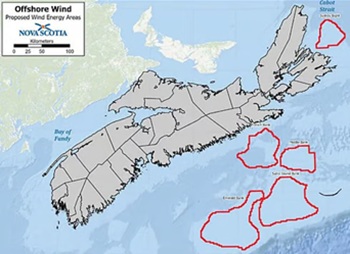 It’s an ill wind that blows nobody good. And in Germany, it might be better if the wind didn’t blow at all after the European Union member moved to start dismantling its flagship Alpha Ventus project after just 15 years. Despite its role as a pioneering wind farm, Alpha Ventus is being shut down — not because of technological failure, but because it is no longer financially viable without massive government subsidies. For Canada, which hopes to use offshore wind to support industries like green hydrogen production, the German experience raises critical questions about the long-term economics of offshore wind power. Without sustained financial support, will Canada’s ambitious offshore wind plans suffer the same fate? Germany has long been a global leader and pioneer in renewable energy. Alpha Ventus was built in 2009 as its first offshore wind farm, benefiting from generous state subsidies. more, >>CLICK TO READ<< 07:44
It’s an ill wind that blows nobody good. And in Germany, it might be better if the wind didn’t blow at all after the European Union member moved to start dismantling its flagship Alpha Ventus project after just 15 years. Despite its role as a pioneering wind farm, Alpha Ventus is being shut down — not because of technological failure, but because it is no longer financially viable without massive government subsidies. For Canada, which hopes to use offshore wind to support industries like green hydrogen production, the German experience raises critical questions about the long-term economics of offshore wind power. Without sustained financial support, will Canada’s ambitious offshore wind plans suffer the same fate? Germany has long been a global leader and pioneer in renewable energy. Alpha Ventus was built in 2009 as its first offshore wind farm, benefiting from generous state subsidies. more, >>CLICK TO READ<< 07:44

Carney acknowledges protesting N.L. fish harvesters during 1st campaign stop
Liberal Leader Mark Carney kicked off his election campaign in St. John’s on Sunday, promising tax cuts and also addressing the hundreds of protesting fish harvesters outside the city’s convention centre. Protesters continued to block the lobby, despite securing a meeting with Fisheries Minister Joanne Thompson and a promise to look at restructuring the Department of Fisheries and Oceans. A heavy police and security presence remained at the centre on Sunday evening, as police guided Liberal attendees through alternative exits. During his speech, Carney acknowledged the protesting harvesters, and said he is there to listen. He said his government will take a closer look at the department of Fisheries and Oceans, with the goal of creating a sustainable fishery and potentially restructuring the department. Videos, photos, more, >>CLICK TO READ<< 06:31
Fish harvesters protest in St. John’s ahead of Carney’s 1st campaign rally
 Newfoundland and Labrador’s fish harvesters quickly rallied on Sunday afternoon following cuts to the snow crab fishery and what they call the Liberals’ mismanagement of the fisheries. About 100 people crowd gathered peacefully outside federal Fisheries Minister Joanne Thompson’s campaign office in St. John’s with the hope of receiving an explanation for major cuts to harvesting snow crab in the 3K area. The division is losing almost a quarter of last year’s total allowable catch at 7,643 tonnes, down from 9,998 tonnes in 2024. Photos, links, more, >>CLICK TO READ<< 16:30
Newfoundland and Labrador’s fish harvesters quickly rallied on Sunday afternoon following cuts to the snow crab fishery and what they call the Liberals’ mismanagement of the fisheries. About 100 people crowd gathered peacefully outside federal Fisheries Minister Joanne Thompson’s campaign office in St. John’s with the hope of receiving an explanation for major cuts to harvesting snow crab in the 3K area. The division is losing almost a quarter of last year’s total allowable catch at 7,643 tonnes, down from 9,998 tonnes in 2024. Photos, links, more, >>CLICK TO READ<< 16:30
FFAW Demands Reassessment of DFO’s Snow Crab Quota Cuts Following Overnight Protest
 The FFAW says it has been told by the Department of Fisheries and Oceans that a reduction is coming for snow crab in the 3K zone. The union says it has been told that a 25 per cent reduction was coming for offshore harvesters and 20 per cent for inshore. The union said late Friday night that the move is “misaligned with the ecological realities of the region.” On Friday, some 200 harvesters rallied outside the DFO office in Grand Falls-Windsor to protest proposed cuts to the snow crab quota in area 3K. Meanwhile, the FFAW says their occupation of the DFO office in Grand Falls-Windsor overnight Friday was peaceful, despite not being invited into the office. Photos, links, more, >>CLICK TO READ<< 10:47
The FFAW says it has been told by the Department of Fisheries and Oceans that a reduction is coming for snow crab in the 3K zone. The union says it has been told that a 25 per cent reduction was coming for offshore harvesters and 20 per cent for inshore. The union said late Friday night that the move is “misaligned with the ecological realities of the region.” On Friday, some 200 harvesters rallied outside the DFO office in Grand Falls-Windsor to protest proposed cuts to the snow crab quota in area 3K. Meanwhile, the FFAW says their occupation of the DFO office in Grand Falls-Windsor overnight Friday was peaceful, despite not being invited into the office. Photos, links, more, >>CLICK TO READ<< 10:47
Some regions see large cuts to snow crab quotas, while total catch rises
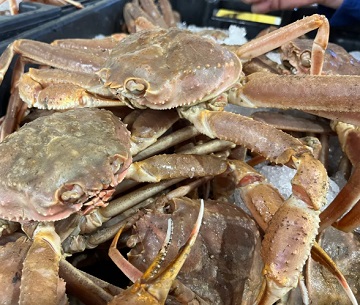 Some areas of Newfoundland and Labrador’s snow crab fishery have seen major reductions, despite the total allowable catch as a whole going up 9 per cent. The Department of Fisheries and Oceans released their annual quota Saturday morning, but protesters were already demonstrating Friday in Grand Falls-Windsor against anticipated cuts in division 3K. Those cuts did arrive. 3K is the hardest hit, losing almost a quarter of last year’s total allowable catch at 7,643 tonnes, down from 9,998 tonnes in 2024. The FFAW is already anticipating a difficult season due to tariffs in the U.S., the single largest buyer of N.L. snow crab. In a release, the union said the cuts were “wholly unacceptable to fish harvesters, as they are fundamentally misaligned with the ecological realities of the region.” more, >> CLICK TO READ<< 16:31
Some areas of Newfoundland and Labrador’s snow crab fishery have seen major reductions, despite the total allowable catch as a whole going up 9 per cent. The Department of Fisheries and Oceans released their annual quota Saturday morning, but protesters were already demonstrating Friday in Grand Falls-Windsor against anticipated cuts in division 3K. Those cuts did arrive. 3K is the hardest hit, losing almost a quarter of last year’s total allowable catch at 7,643 tonnes, down from 9,998 tonnes in 2024. The FFAW is already anticipating a difficult season due to tariffs in the U.S., the single largest buyer of N.L. snow crab. In a release, the union said the cuts were “wholly unacceptable to fish harvesters, as they are fundamentally misaligned with the ecological realities of the region.” more, >> CLICK TO READ<< 16:31
Fishing tug sinks at Howdenvale dock
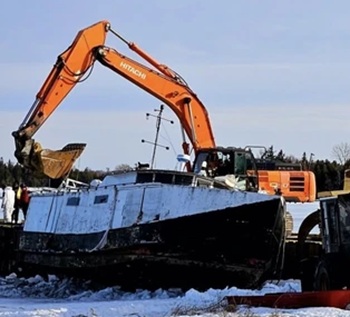 Another tugboat has sunk while tied up at a government dock on the Lake Huron side of the Bruce Peninsula, most recently earlier this month at Howdenvale. The Canadian Coast Guard said Friday in an emailed response to questions that it received a report on March 10 that “Keep the Change,” a 30-foot fishing tug, was sinking at the harbour and diesel was released into the water. The vessel owner and Chippewas of Nawash Fisheries Assessment Program staff deployed an absorbent boom and pads. The Coast Guard also deployed a containment boom around the vessel to limit the spread of pollution, the email said. more, >>CLICK TO READ<< 10:40
Another tugboat has sunk while tied up at a government dock on the Lake Huron side of the Bruce Peninsula, most recently earlier this month at Howdenvale. The Canadian Coast Guard said Friday in an emailed response to questions that it received a report on March 10 that “Keep the Change,” a 30-foot fishing tug, was sinking at the harbour and diesel was released into the water. The vessel owner and Chippewas of Nawash Fisheries Assessment Program staff deployed an absorbent boom and pads. The Coast Guard also deployed a containment boom around the vessel to limit the spread of pollution, the email said. more, >>CLICK TO READ<< 10:40
As the elver season opens, a First Nation is pushing back hard against DFO
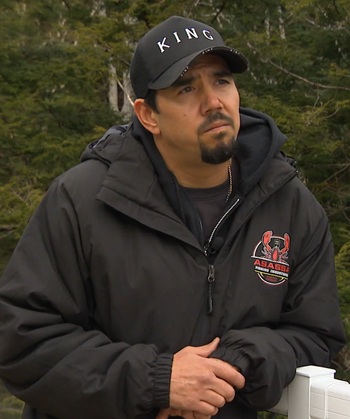 In the coming weeks, Matthew Cope will anchor his cone-shaped fyke net along a river, and as the overnight hours creep by and the ocean tide comes in, he will catch tiny but highly lucrative juvenile eels. He will do so, however, without authorization from the Department of Fisheries, asserting that as a Mi’kmaw harvester, he has a treaty right to fish for the young eels, known as elvers, even outside of federal regulations. He expects to be stopped, and even arrested by fisheries officers, as he was last year during an elver seizure at a transport facility in Dartmouth, N.S. Video, more, >>CLICK TO READ<< 06:40
In the coming weeks, Matthew Cope will anchor his cone-shaped fyke net along a river, and as the overnight hours creep by and the ocean tide comes in, he will catch tiny but highly lucrative juvenile eels. He will do so, however, without authorization from the Department of Fisheries, asserting that as a Mi’kmaw harvester, he has a treaty right to fish for the young eels, known as elvers, even outside of federal regulations. He expects to be stopped, and even arrested by fisheries officers, as he was last year during an elver seizure at a transport facility in Dartmouth, N.S. Video, more, >>CLICK TO READ<< 06:40
Big day for little shrimp: NL fish union hopes positive update on northern shrimp stock status translates into good news for fishery
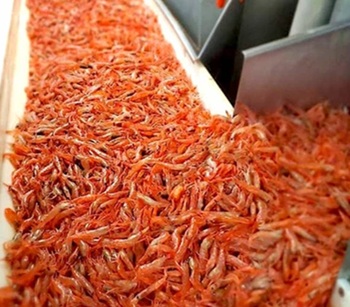 The latest stock assessment for northern shrimp, which used a revised approach to project the health of the species off the Newfoundland and Labrador coast, is being welcomed by the union that represents the provinces inshore harvesters and plant workers. In a technical briefing on Wednesday, March 19, the federal Department of Fisheries and Oceans (DFO) officially projected northern shrimp will be in the healthy zone, in accordance to the department’s precautionary approach to species management. For the latest assessment, DFO combined six fishing areas all along the eastern coasts of Newfoundland and Labrador, collapsing them into two stock assessment regions divided by the boundary between Northwest Atlantic Fisheries Organization (NAFO) Divisions 2H and 2J. more, >>CLICK TO READ<< 06:12
The latest stock assessment for northern shrimp, which used a revised approach to project the health of the species off the Newfoundland and Labrador coast, is being welcomed by the union that represents the provinces inshore harvesters and plant workers. In a technical briefing on Wednesday, March 19, the federal Department of Fisheries and Oceans (DFO) officially projected northern shrimp will be in the healthy zone, in accordance to the department’s precautionary approach to species management. For the latest assessment, DFO combined six fishing areas all along the eastern coasts of Newfoundland and Labrador, collapsing them into two stock assessment regions divided by the boundary between Northwest Atlantic Fisheries Organization (NAFO) Divisions 2H and 2J. more, >>CLICK TO READ<< 06:12
Harvesters Applaud Long-Overdue Changes to Northern Shrimp Assessment; New Model Moves Species into Healthy Zone
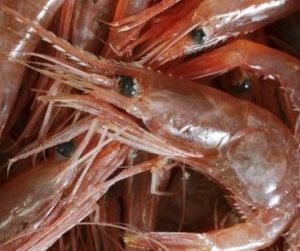 FFAW-Unifor welcomes the updated Northern Shrimp assessment model, which officially shifts the species into the healthy zone under revised stock areas, assessment model and reference points. FFAW scientist Dr. Erin Carruthers participated in the assessment process, along with shrimp harvesters Chris Rose and Heather Starkes, who praised the innovative and collaborative approach to align the assessment process with ecosystem realities. “This is a long overdue recognition of the ecological realities in Newfoundland and Labrador marine ecosystems. We appreciate the considerable efforts to solve this long-standing issue and the commitment of shrimp harvesters and Dr. Erin Carruthers, to see this effort through to the end,” says FFAW-Unifor President Dwan Street, adding that, “the next step, of course, is to ensure inshore fleets’ access and allocations reflect the change in stock status.” more, >>CLICK TO READ<< 09:29
FFAW-Unifor welcomes the updated Northern Shrimp assessment model, which officially shifts the species into the healthy zone under revised stock areas, assessment model and reference points. FFAW scientist Dr. Erin Carruthers participated in the assessment process, along with shrimp harvesters Chris Rose and Heather Starkes, who praised the innovative and collaborative approach to align the assessment process with ecosystem realities. “This is a long overdue recognition of the ecological realities in Newfoundland and Labrador marine ecosystems. We appreciate the considerable efforts to solve this long-standing issue and the commitment of shrimp harvesters and Dr. Erin Carruthers, to see this effort through to the end,” says FFAW-Unifor President Dwan Street, adding that, “the next step, of course, is to ensure inshore fleets’ access and allocations reflect the change in stock status.” more, >>CLICK TO READ<< 09:29
Athearn Marine Agency Boat of the Week: 38′ Calvin Beal Lobster Boat, 476HP Cat C9 Diesel
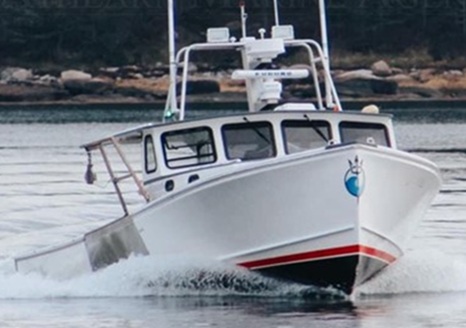 To review specifications, information, with 14 photos, >click here<. To see all the boats in this series >click here< 05:53
To review specifications, information, with 14 photos, >click here<. To see all the boats in this series >click here< 05:53
N.L. succeeding in finding markets outside U.S. at seafood expo in Boston, minister says
 Newfoundland and Labrador Fisheries Minister Gerry Byrne says efforts to diversify to markets beyond the United States have been successful at Seafood Expo North America in Boston but isn’t ready to share exactly where provincial products could be going. Byrne is part of a Newfoundland and Labrador delegation attending the ongoing seafood expo, which includes unions, plant representatives and more. Representatives from 50 countries make up the largest seafood gathering on the continent which is giving Canadian operations the chance to explore new markets as the threat of tariffs from the United States and China loom. Video, more, >>CLICK TO READ<< 11:03
Newfoundland and Labrador Fisheries Minister Gerry Byrne says efforts to diversify to markets beyond the United States have been successful at Seafood Expo North America in Boston but isn’t ready to share exactly where provincial products could be going. Byrne is part of a Newfoundland and Labrador delegation attending the ongoing seafood expo, which includes unions, plant representatives and more. Representatives from 50 countries make up the largest seafood gathering on the continent which is giving Canadian operations the chance to explore new markets as the threat of tariffs from the United States and China loom. Video, more, >>CLICK TO READ<< 11:03
Maritime seafood industry officials looking for new buyers at Boston expo
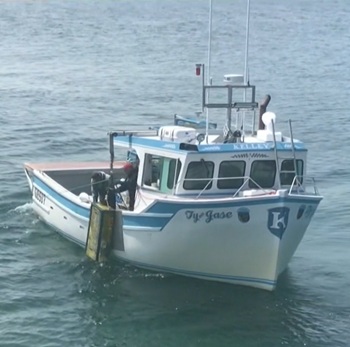 The Seafood Expo North America is the largest event of its kind on the continent. With importers, exporters, wholesalers and hotel operators from 50 countries in attendance, it’s the perfect place to pitch Nova Scotia seafood to the world. “I was expecting doom and gloom when I came down here and it is not that. There’s a lot more optimism for the demand for our product and will be able to get through this storm,” says Fisheries Minister Kent Smith. Smith says Nova Scotia companies have a deal with a new contact in the Philippines and one is in the works with an existing importer in Spain to expand that market. Lobster seller Shawn Landry has been busy, too. “Singapore was one of the ones that we talked with. Southeast Asia, Italy, and Europe,” he says. more, >>CLICK TO READ<< 07:47
The Seafood Expo North America is the largest event of its kind on the continent. With importers, exporters, wholesalers and hotel operators from 50 countries in attendance, it’s the perfect place to pitch Nova Scotia seafood to the world. “I was expecting doom and gloom when I came down here and it is not that. There’s a lot more optimism for the demand for our product and will be able to get through this storm,” says Fisheries Minister Kent Smith. Smith says Nova Scotia companies have a deal with a new contact in the Philippines and one is in the works with an existing importer in Spain to expand that market. Lobster seller Shawn Landry has been busy, too. “Singapore was one of the ones that we talked with. Southeast Asia, Italy, and Europe,” he says. more, >>CLICK TO READ<< 07:47
Tariff fears and high stakes for Atlantic Canada at the Boston Seafood Expo
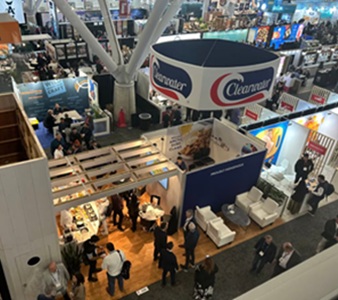 Seafood industry reps from more than 50 countries are in Boston for what is usually an exciting three days of meetings, showcases, and networking at the annual Seafood Expo North America. This year, though, the stakes have never been higher for Atlantic Canadians. Fears of potential industry-rocking tariffs from the United States and China are overshadowing everything happening on the show floor. The expo is playing out during a moment of potential crisis for the Canadian seafood landscape, as economic tariffs that would apply to seafood loom large, along with uncertainty about what will happen if the new charges do happen.Video, more, >>CLICK TO READ<< 07:12
Seafood industry reps from more than 50 countries are in Boston for what is usually an exciting three days of meetings, showcases, and networking at the annual Seafood Expo North America. This year, though, the stakes have never been higher for Atlantic Canadians. Fears of potential industry-rocking tariffs from the United States and China are overshadowing everything happening on the show floor. The expo is playing out during a moment of potential crisis for the Canadian seafood landscape, as economic tariffs that would apply to seafood loom large, along with uncertainty about what will happen if the new charges do happen.Video, more, >>CLICK TO READ<< 07:12
Fight of his life: Well-known NL advocate must travel to Toronto to await lung transplant
 Merv Wiseman is literally fighting a battle for his life, but he still wants it to be about finding a way to help others. The retired Canadian Coast Guard employee has spent his life leading the advocacy charge on several fronts, including issues affecting wild commercial fisheries, the fur industry, search and rescue services and agriculture. Now, the 71-year-old is dealing with worsening symptoms of pulmonary fibrosis, a condition he was diagnosed with several years ago, which has rapidly progressed within the past year. Wiseman, whose mobility these days is hampered by having to constantly be connected to an oxygen tank, is still at his home in North Harbour, Placentia Bay, but is hoping to be in Toronto by the end of March. He has no idea when he will get the double lung transplant, he requires, but needs to be close to Toronto General Hospital for when a matching donor does become available. more, >>CLICK TO READ<< 14:04
Merv Wiseman is literally fighting a battle for his life, but he still wants it to be about finding a way to help others. The retired Canadian Coast Guard employee has spent his life leading the advocacy charge on several fronts, including issues affecting wild commercial fisheries, the fur industry, search and rescue services and agriculture. Now, the 71-year-old is dealing with worsening symptoms of pulmonary fibrosis, a condition he was diagnosed with several years ago, which has rapidly progressed within the past year. Wiseman, whose mobility these days is hampered by having to constantly be connected to an oxygen tank, is still at his home in North Harbour, Placentia Bay, but is hoping to be in Toronto by the end of March. He has no idea when he will get the double lung transplant, he requires, but needs to be close to Toronto General Hospital for when a matching donor does become available. more, >>CLICK TO READ<< 14:04

Canadian crab, lobster industry officials look for answers in Boston
Canadian crab and lobster industry representatives, including some from New Brunswick, will be looking for answers and opportunities at a seafood exhibition in Boston. The goal is to develop relations with other industry players as Canada faces tariff troubles with both the U.S. and China. The expo attracts many countries. Major seafood exporters set up booths at the show. “It’s going to be very difficult to settle on prices given that we have to build in that the tariffs are happening,” said Geoff Irvine, executive director of the Lobster Council of Canada. The expo attracts many countries. Major seafood exporters set up booths at the show. “I’ll be looking to see what they do, how they do it, how they pay for it, and try to bring that home, and once again attempt to come up with a marketing strategy for all Canadian seafood,” said Irvine. Photos, more, >>CLICK TO READ<< 09:05
Nova Scotia (Canada) Identifies Five Areas for Offshore Wind Development
 The Nova Scotian government has identified five areas it considers suitable for installing wind turbines in offshore wind farms. The government issued a statement Friday indicating that the next step is to solicit input from Nova Scotians before granting official designations, a process that will conclude on April 14. “Canada, with the world’s longest coastline, a stable regulatory environment, and decades of experience in offshore wind development, is well positioned to enter the trillion-dollar global offshore wind market,” the provincial government stated in a discussion paper released Friday. The province’s goal is to license up to five gigawatts of offshore wind energy by 2030. more, >>CLICK TO READ<< 07:50
The Nova Scotian government has identified five areas it considers suitable for installing wind turbines in offshore wind farms. The government issued a statement Friday indicating that the next step is to solicit input from Nova Scotians before granting official designations, a process that will conclude on April 14. “Canada, with the world’s longest coastline, a stable regulatory environment, and decades of experience in offshore wind development, is well positioned to enter the trillion-dollar global offshore wind market,” the provincial government stated in a discussion paper released Friday. The province’s goal is to license up to five gigawatts of offshore wind energy by 2030. more, >>CLICK TO READ<< 07:50
Hitting pause: Talks to set price for 2025 snow crab season in NL on hold
 There’s still no deal, but both sides trying to hammer out a new pricing formula for Newfoundland and Labrador’s snow crab fishery have agreed to pause talks until March 19. That will be one day after Seafood Expo North America, the major annual seafood show in Boston, where this year’s provincial delegation will be looking to convince American buyers that tariffs placed on Canadian exports, including seafood, are not a good thing for the sector. The negotiators from both FFAW-Unifor, the union that represents fish harvesters and plant workers, and the Association of Seafood Producers (ASP), which represents fish processing companies, have met several times since the middle of January to try to hammer out a snow crab price for the 2025 season. more, >>CLICK TO READ<< 06:38
There’s still no deal, but both sides trying to hammer out a new pricing formula for Newfoundland and Labrador’s snow crab fishery have agreed to pause talks until March 19. That will be one day after Seafood Expo North America, the major annual seafood show in Boston, where this year’s provincial delegation will be looking to convince American buyers that tariffs placed on Canadian exports, including seafood, are not a good thing for the sector. The negotiators from both FFAW-Unifor, the union that represents fish harvesters and plant workers, and the Association of Seafood Producers (ASP), which represents fish processing companies, have met several times since the middle of January to try to hammer out a snow crab price for the 2025 season. more, >>CLICK TO READ<< 06:38
NL MP Joanne Thompson named Minister of Fisheries and Oceans, Coast Guard
 For the first time since 2008, a politician from Newfoundland and Labrador will head up the country’s Department of Fisheries and Oceans and Canadian Coast Guard. Joanne Thompson was sworn in as federal minister of Fisheries, Oceans and the Canadian Coast Guard on Friday, March 14, 2025, in Ottawa in the cabinet of new Prime Minister Mark Carney. Thompson, the MP for St. John’s East, was first elected in September 2021. She was most recently Minister for Seniors under the former prime minister, Justin Trudeau. more, >>CLICK TO READ<< 15:31
For the first time since 2008, a politician from Newfoundland and Labrador will head up the country’s Department of Fisheries and Oceans and Canadian Coast Guard. Joanne Thompson was sworn in as federal minister of Fisheries, Oceans and the Canadian Coast Guard on Friday, March 14, 2025, in Ottawa in the cabinet of new Prime Minister Mark Carney. Thompson, the MP for St. John’s East, was first elected in September 2021. She was most recently Minister for Seniors under the former prime minister, Justin Trudeau. more, >>CLICK TO READ<< 15:31Fire levels Cape John Crabs and Seafood plant
 Two fishermen wondered about the future the day after fire devastated the Cape John Crabs and Seafood plant. Wayne and Roy, who didn’t provide last names, said they both did business with the plant over the years and enjoyed a good relationship. “I guess we’ll have to find somewhere else now,” Wayne said March 13, adding he and his wife were coming from Tatamagouche and could easily see the flames rising in the air. “It didn’t take long,” added the veteran fisherman. Photos, more, >>CLICK TO READ<< 10:23
Two fishermen wondered about the future the day after fire devastated the Cape John Crabs and Seafood plant. Wayne and Roy, who didn’t provide last names, said they both did business with the plant over the years and enjoyed a good relationship. “I guess we’ll have to find somewhere else now,” Wayne said March 13, adding he and his wife were coming from Tatamagouche and could easily see the flames rising in the air. “It didn’t take long,” added the veteran fisherman. Photos, more, >>CLICK TO READ<< 10:23
Snow crab now crab as FFAW and ASP show willingness to work together
 A week of long days and almost around the clock negotiations has left the Fish, Food and Allied Workers union and the Association of Seafood Producers optimistic that a snow crab harvest will happen this year. “The FFAW and ASP have done an incredible job together to have constructive conversations at this point,” ASP executive director Jeff Loder said Wednesday. “Of course, until you get a deal, you have no deal. But I am cautiously optimistic that we are close.” The two sides are keen to negotiate a deal as soon as possible. A meeting with a price setting panel is scheduled for March 20 should the two sides not make an agreement by then. Video, more, >>CLICK TO READ<< 06:08
A week of long days and almost around the clock negotiations has left the Fish, Food and Allied Workers union and the Association of Seafood Producers optimistic that a snow crab harvest will happen this year. “The FFAW and ASP have done an incredible job together to have constructive conversations at this point,” ASP executive director Jeff Loder said Wednesday. “Of course, until you get a deal, you have no deal. But I am cautiously optimistic that we are close.” The two sides are keen to negotiate a deal as soon as possible. A meeting with a price setting panel is scheduled for March 20 should the two sides not make an agreement by then. Video, more, >>CLICK TO READ<< 06:08
A Fundraiser for Merv Wiseman – Advocate Merv Wiseman has lent a hand all his life, now he needs one
 A Go-Fund-Me campaign has been launched to raise money for Merv Wiseman, a retired Canadian Coast Guard employee best known as a tireless advocate for a variety causes from wild commercial fisheries and the fur industry to search and rescue services and agriculture. “Merv has lent his hand to good causes his entire life, and it’s only right we lend him a hand now in his hour of need,” says Peter Leonard, spokesman for the fundraiser. Merv suffers from pulmonary fibrosis, a chronic lung disease, but has been approved for the waiting list for a life-saving, double-lung transplant at the Toronto General Hospital. He and his wife, Eileen, must relocate from their home in North Harbour, Placentia Bay, to a residence within 10-minutes of the hospital to be ready for an operation at any time.more, >>CLICK TO READ<< 19:06
A Go-Fund-Me campaign has been launched to raise money for Merv Wiseman, a retired Canadian Coast Guard employee best known as a tireless advocate for a variety causes from wild commercial fisheries and the fur industry to search and rescue services and agriculture. “Merv has lent his hand to good causes his entire life, and it’s only right we lend him a hand now in his hour of need,” says Peter Leonard, spokesman for the fundraiser. Merv suffers from pulmonary fibrosis, a chronic lung disease, but has been approved for the waiting list for a life-saving, double-lung transplant at the Toronto General Hospital. He and his wife, Eileen, must relocate from their home in North Harbour, Placentia Bay, to a residence within 10-minutes of the hospital to be ready for an operation at any time.more, >>CLICK TO READ<< 19:06
Humane, sustainable Canadian seal harvests an environmental necessity, says USIANL
 The United Seal Industry Association of Newfoundland & Labrador (USIANL) has created a fact-based campaign explaining the environmental necessity for Canada to carry out sustainable seal harvests. The campaign is being piloted in N.L., Halifax, Toronto, Ottawa, Edmonton, Winnipeg, and Vancouver. USIANL was created to help Canadians understand that humane, sustainable seal harvests are an environmental necessity. The harp seal population off N.L. is the largest in the world – numbering in the millions. Not only are harp seals depleting important fish species and everything those species feed on, but fierce competition for food is putting their own well-being at risk. more, >>CLICK TO READ<< 09:39
The United Seal Industry Association of Newfoundland & Labrador (USIANL) has created a fact-based campaign explaining the environmental necessity for Canada to carry out sustainable seal harvests. The campaign is being piloted in N.L., Halifax, Toronto, Ottawa, Edmonton, Winnipeg, and Vancouver. USIANL was created to help Canadians understand that humane, sustainable seal harvests are an environmental necessity. The harp seal population off N.L. is the largest in the world – numbering in the millions. Not only are harp seals depleting important fish species and everything those species feed on, but fierce competition for food is putting their own well-being at risk. more, >>CLICK TO READ<< 09:39

F/V Elite Navigator carried more safety equipment than required, writes TSB in investigation report
It’s impossible to know what caused the fire on the Elite Navigator in July 2024, as the fishing vessel was never recovered. But nearly seven months later, the Transportation Safety Board of Canada’s (TSB) investigation reveals what happened in the vessel’s final moments. According to the TSB report released on Wednesday, light smoke was visible in the engine room soon after a smoke alarm sounded at 7:30 p.m. NT. “A crew member in the deckhouse yelled that there was a fire in the exhaust trunking.” The report says the crew of the Elite Navigator were highly skilled in distress communications, even carrying devices not required by regulation like satellite communication devices and cell phones. more, >>CLICK TO READ<< 16:22






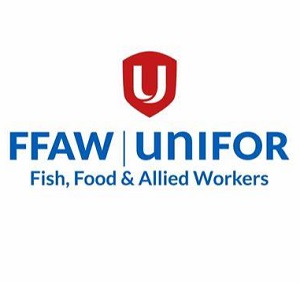 The Fish, Food and Allied Workers Union (FFAW-Unifor) is raising serious concerns after Royal Greenland’s St. Anthony Seafoods (SAS) production plant was found chained shut with “closed” signs posted on the gate, just 48 hours after the company. On Tuesday, FFAW-Unifor tabled its first proposal during negotiations in Deer Lake, focusing on key issues such as voluntary overtime and a guaranteed day of rest per week — standard provisions in fish plant contracts across the province. The company refused to present a counteroffer or engage meaningfully, abruptly leaving the session within the first 10 minutes without explanation. Senior Conciliator, Brian Kenny, from the Government of Newfoundland and Labrador was present to witness the incident.
The Fish, Food and Allied Workers Union (FFAW-Unifor) is raising serious concerns after Royal Greenland’s St. Anthony Seafoods (SAS) production plant was found chained shut with “closed” signs posted on the gate, just 48 hours after the company. On Tuesday, FFAW-Unifor tabled its first proposal during negotiations in Deer Lake, focusing on key issues such as voluntary overtime and a guaranteed day of rest per week — standard provisions in fish plant contracts across the province. The company refused to present a counteroffer or engage meaningfully, abruptly leaving the session within the first 10 minutes without explanation. Senior Conciliator, Brian Kenny, from the Government of Newfoundland and Labrador was present to witness the incident.  Millbrook First Nation has informed Fisheries and Oceans Canada (DFO) the Mi’kmaq are entitled to the entire elver fishery should they choose to pursue it, rather than the 50 per cent on offer from the federal government. In a March 5 letter to elver review director Jennifer Ford, Millbrook Chief Bob Gloade elaborates to say federal fisheries officers have no authority over its membership, that as the stock of juvenile American eels is healthy, they won’t accept any federal government limitations on what they catch, and the Mi’kmaq traditional territory extends to all Nova Scotia rivers.
Millbrook First Nation has informed Fisheries and Oceans Canada (DFO) the Mi’kmaq are entitled to the entire elver fishery should they choose to pursue it, rather than the 50 per cent on offer from the federal government. In a March 5 letter to elver review director Jennifer Ford, Millbrook Chief Bob Gloade elaborates to say federal fisheries officers have no authority over its membership, that as the stock of juvenile American eels is healthy, they won’t accept any federal government limitations on what they catch, and the Mi’kmaq traditional territory extends to all Nova Scotia rivers. 


























